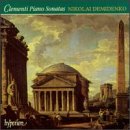| All Artists: Muzio Clementi, Nikolai Demidenko Title: Muzio Clementi: Piano Sonatas Members Wishing: 3 Total Copies: 0 Label: Hyperion UK Release Date: 8/22/1995 Album Type: Import Genre: Classical Styles: Chamber Music, Forms & Genres, Sonatas, Historical Periods, Classical (c.1770-1830) Number of Discs: 1 SwapaCD Credits: 1 UPC: 034571168081 |
Search - Muzio Clementi, Nikolai Demidenko :: Muzio Clementi: Piano Sonatas
 | Muzio Clementi, Nikolai Demidenko Muzio Clementi: Piano Sonatas Genre: Classical
|
Larger Image |
CD Details |
CD ReviewsSurprisingly Good Clementi Sonatas in Excellent Performances J Scott Morrison | Middlebury VT, USA | 01/15/2005 (5 out of 5 stars) "Muzio Clementi was born before Mozart and outlived Beethoven. He was a child prodigy in Italy who was 'bought' from his father by an English tourist who brought him to England where after he finished his seven years' indenture he moved to London and spent most of the rest of his life. He had a long and varied career as pianist, publisher, teacher, entrepreneur, and even as a very successful piano manufacturer. He was sufficiently virtuosic to have competed in a piano-playing contest with Mozart before Austrian Emperor Joseph II in 1781, playing his Sonata in B flat, Op. 24, No. 2 (which is included on this disc). Mozart later wrote his father that 'Clementi plays well ... apart from that, he has not a kreuzer's worth of taste or feeling--in short he is a mere "mechanicus".' That notwithstanding, Mozart stole the opening theme from the sonata Clementi played that day and used it years later in the Overture to 'Magic Flute'. The composer's style developed considerably over the years and this is amply demonstrated on this CD. His works extend from the earliest galant style to the passionate affect of Romantic piano music. One hears Alberti basses in the early sonatas and in the late sonatas there are intimations of Chopin. The four sonatas on this disc do not cover that entire range but gives us some idea of how Clementi's style was developing. Nikolai Demidenko, a pianist more often associated with music of the Russian romantics--Rachmaninoff, Medtner, Tchaikovsky--is a wonderful exponent of these works. He is given rich crystalline sound. The architectural lucidity of his playing is exemplary. Clementi is known to many piano students as the composer of simple teaching sonatinas. But here we get to know some of Clementi's more ambitious works. They will be a revelation to any who know only the sonatinas. There are movements here that would be worthy of Mozart or Beethoven. Demidenko is quoted in the booklet notes as comparing the slow movement of the F Sharp Minor Sonata, Op. 25, No. 5 to that of Beethoven's last sonata, Op. 111--not an unworthy observation. Otherwise this sonata reminds one of late Haydn sonatas in their classical perfection of form. Two of the Opus 40 sonatas are included, No. 2 in B Minor & No. 3 in D Major. From 1802, and thus much later than the earlier two played here, they are more or less contemporaneous with Beethoven's Op. 10 sonatas and share many of the same musical gestures. They are technically more demanding than the earlier works and somewhat experimental in formal design. Each of these sonatas has long slow movement; in the B Minor the adagio is interrupted by a short allegro middle section, returns to the adagio and then, without interruption, erupts into the brilliant presto finale. One hallmark of Clementi's style is the use of canons in rather strict form which nonetheless convey strong romantic pathos. This is particularly notable in the B Minor sonata. Demidenko's classically balanced playing is a revelation for those who have only heard him in the late Romantic repertoire. I'd love to hear more from him in this corner of the literature. The booklet essay by noted piano maven Ates Orga are, as expected, extremely informative. A release worthy of investigation by those interested in classical and early romantic piano literature. TT=68'40" Scott Morrison" Another Winner From Demidenko Walter Fekula | New York, NY USA | 12/12/2004 (5 out of 5 stars) "This recording dates back to December, 1994 and consists of 4 sonatas composed by Muzio Clementi (1752 - 1832), a man born in Rome who spent the greatest part of his long life in England where in addition to composing, he taught (Meyerbeer, Field), published (Beethoven) and even engaged in piano making. A tourist who heard him playing an organ at the age of 13 in Italy brought him to England where he spent the next 7 years in solitary study before making it to London on his own. He was very briefly married at the age of 52 after a few failed attempts, but unfortunately his 18-year-old bride died in childbirth the following year. He remarried in 1811 and fathered 4 children. He was very much in demand during his lifetime and his piano music had much influence with such giants as Beethoven. He is buried in Westminster Abbey. Tragically, although a publisher he failed to put much of his symphonic output into print. Only 6 of his estimated 20 symphonies are known. It is his keyboard music,however, which survives and gains him entry into the list of great composers. It is worthy indeed and the listener will glean much by hearing this music through the elegant and brilliant performance of Nicolai Demedenko. As usual, Hyperion has done a masterful job in recording this under-rated music"
|

 Track Listings (15) - Disc #1
Track Listings (15) - Disc #1